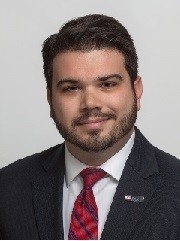Robert Schell
Assistant V.P., Corporate Treasury, U.S. Bank
Master of Financial Mathematics
Class of 2016
Pursuing the MFM while also working professionally helped me supercharge my early career. The fact that I was investing in furthering my quantitative skills helped me stand out to recruiters and hiring managers even before I finished the program. Understanding the dynamics underlying interest rates, yield curves, forwards, and options from a foundational perspective gave me a leg up starting a career in banking.
What has been a very practical skill that I continue to use is coding, with an emphasis on the rigor expected in financial settings. Also, I fear no math: anything that comes my way at work is easier than what I already tackled in graduate school!
Being able to communicate across different levels of technical sophistication is key. It’s not enough to just be able to put your head down and do the math—you have to explain and justify your answer to managers and leaders who don’t understand the technical details. On the other hand, it’s not enough to just have a great idea anymore—you have to be able to back it up with the numbers. The most successful MFM students and the most successful finance practitioners can do both.
The MFM program is a way to do something off the beaten path and stand out from the crowds of MBAs and hordes of CFAs. One of the most satisfying aspects of MFCAM and the MFM program is the amazing network of alumni in the Twin Cities. This includes former classmates, mid-career practitioners in a variety of industries, and even teachers in the program who are alums themselves. It’s an incredible group to learn from and a valuable resource for both current students and the Minnesota business community.
